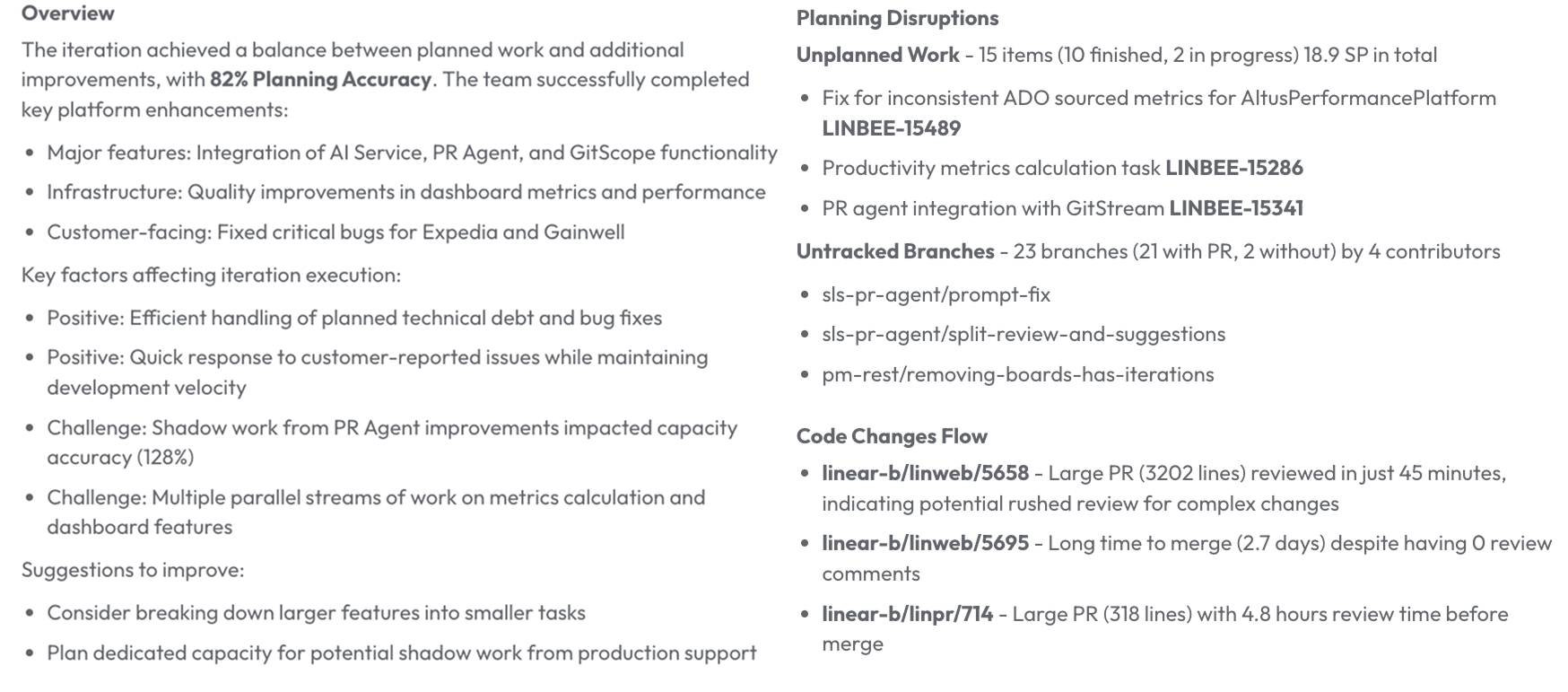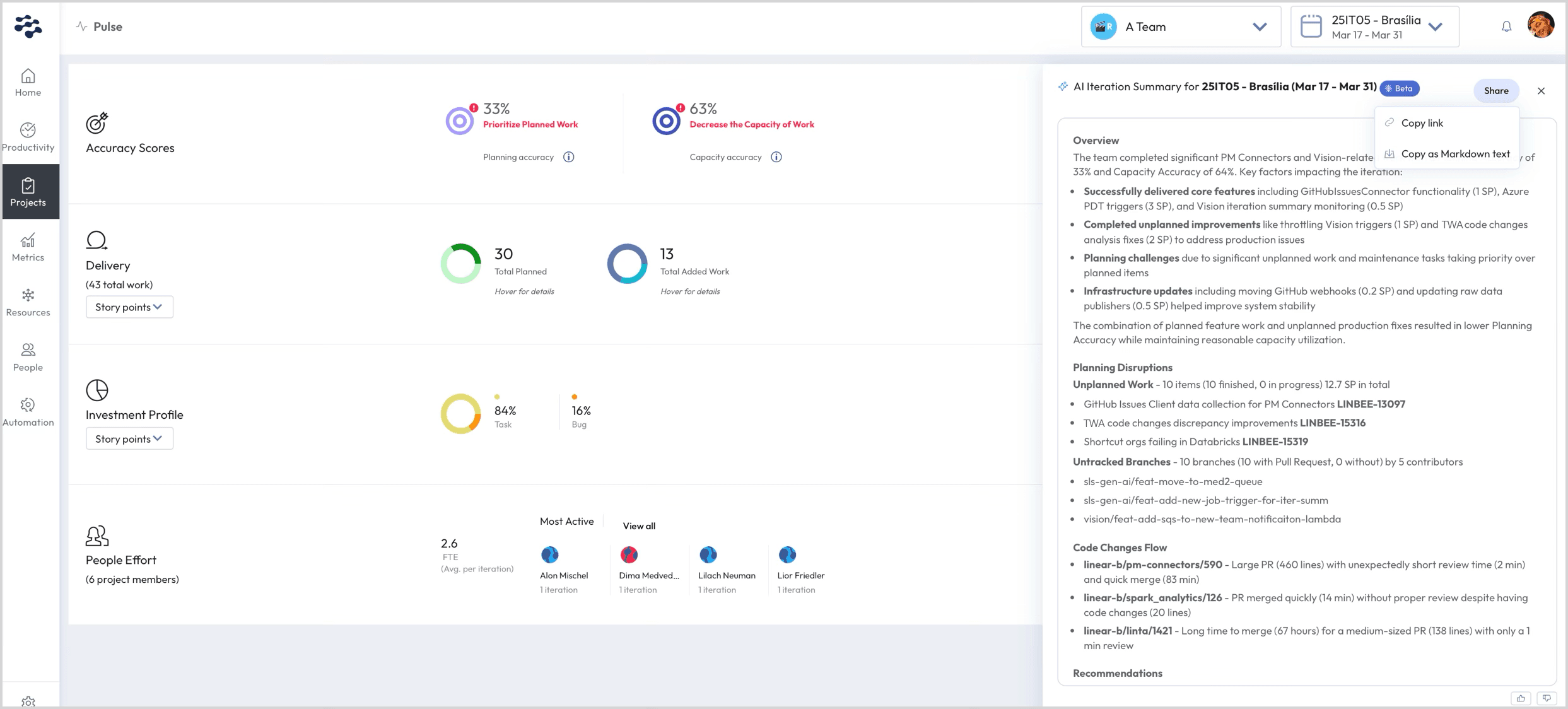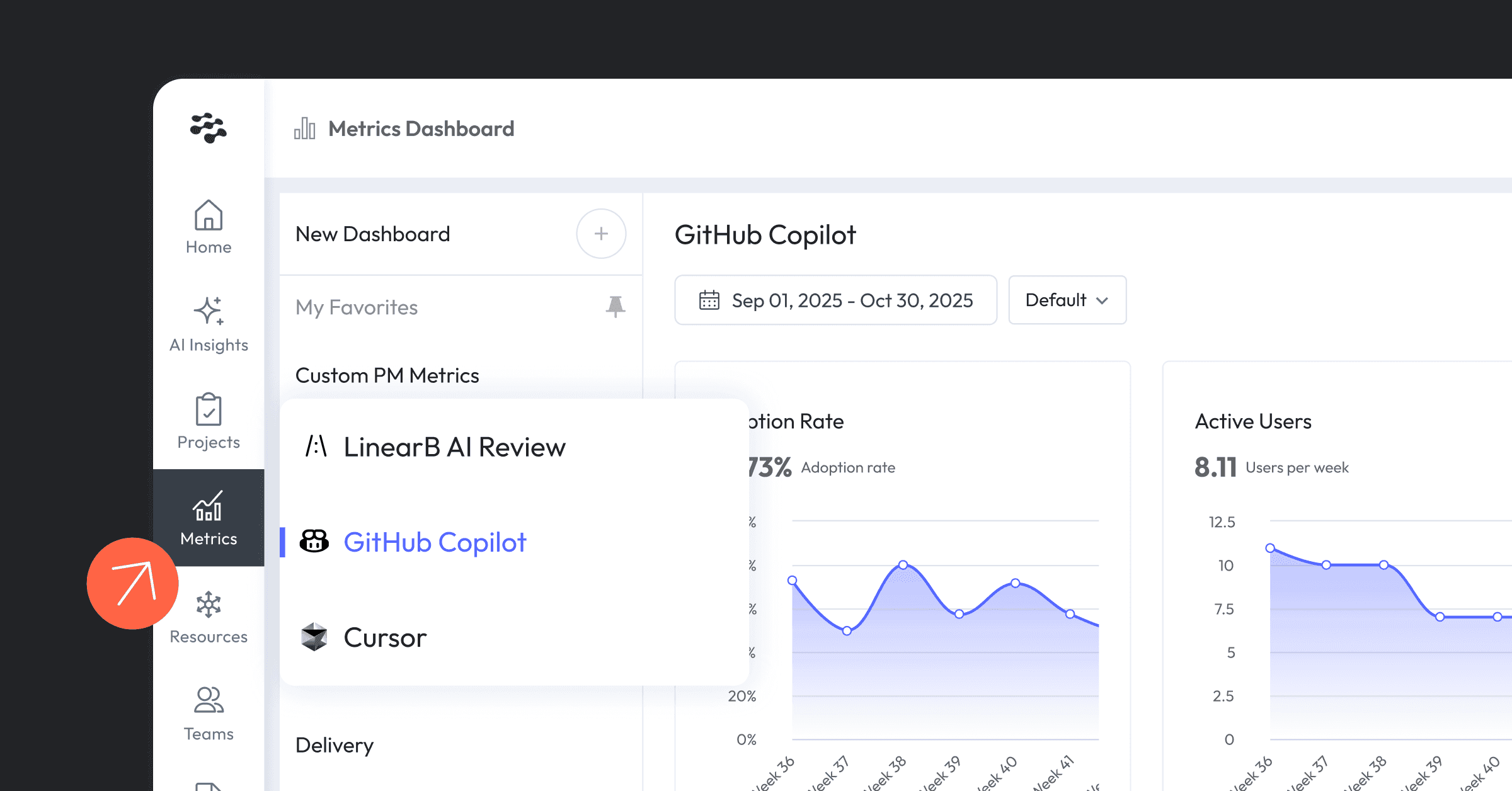If you’re running Scrum, you know the drill: every iteration ends with a retrospective, which is your chance for the team to reflect, celebrate wins, and find ways to improve. But retros often come with a hidden cost: manual status updates.
Before the retro, everyone scrambles to remember what happened. "What went well? What didn’t? What should we do differently?" That’s 10 to 20 minutes per developer, every iteration, spent digging through tasks, PRs, and issues instead of writing code. Multiply that by your whole team, and suddenly, retros feel less like continuous improvement and more like manual toil.
Thankfully, you can regain that time with LinearB’s new automatic iteration summaries.
Improve Sprint Retrospectives with AI-Powered Iteration Summaries
LinearB now eliminates that time sink with automatic iteration summaries, which are available for all LinearB users. At the end of every iteration, LinearB analyzes your team’s work across the sprint, automatically generating a comprehensive summary delivered directly to your team channels.
No more manual prep or context-switching; you’ll get clear, objective insights that help your team focus on improving.
What Does the Summary Include?
Our AI automatically surfaces the key points you care about in retrospectives, with data-driven context and examples to make discussions more productive. The summaries include:
- What Went Well? - Celebrate the highlights of the iteration, such as successful deliveries, efficient collaboration, or improvements to key metrics.
- What Didn’t Go Well? - Identify blockers, delays, or bottlenecks that disrupt workflows.
- How Can We Improve? - Surface actionable opportunities for the team to adjust processes, refine workflows, and keep getting better.

Teams love it because it saves time every iteration by eliminating the need to write summaries or dig for updates. It also helps teams stay objective by removing guesswork and human bias, enabling retrospectives based on facts rather than memory. With simplified continuous improvement, consistent reflection becomes part of the process, making it easier for teams to keep learning and growing.
How It Works
- Connect Jira + LinearB + Team Channels - Ensure your Scrum teams are set up in LinearB and linked to Jira and Slack (or MS Teams).
- Do What You Do Best - Build, ship, collaborate. LinearB automatically tracks the data behind the scenes.
- Get Automatic Summaries at the End of Every Sprint - LinearB analyzes completed work and delivers a clear, easy-to-share summary in the Pulse dashboard

From Subjective Discussions to Data-Driven Insights
Traditional retrospectives often rely on team members' memories and perceptions, which can be colored by recency bias or personal frustrations. Automatic iteration summaries transform these subjective conversations into objective, data-backed discussions by providing:
- Quantifiable performance metrics – Track velocity trends, completion rates, and cycle times across iterations
- Workflow bottleneck identification – See exactly where work stalled with precise timing data
- Collaboration patterns – Understand how code reviews, approvals, and handoffs affected delivery
- Commitment vs. delivery analysis – Compare what was planned against what was actually completed
Making Decisions with Confidence
When your team discussions are grounded in data rather than impressions, you can:
- Identify patterns across iterations – Spot recurring challenges that might otherwise go unnoticed
- Measure improvement initiatives – Track whether process changes actually deliver the expected results
- Allocate resources more effectively – Direct your team's focus to the highest-impact improvement areas
- Create accountability – Set measurable goals based on real metrics rather than subjective targets
By removing the guesswork from your retrospectives, LinearB's automatic iteration summaries ensure that your continuous improvement efforts are focused on actual problems rather than perceived ones. This transforms your retros from opinion-based discussions into strategic planning sessions guided by concrete evidence.
Beyond Code Assistance: AI That Transforms Your Development Process
While many teams are exploring AI-powered coding assistants, LinearB's automatic iteration summaries represent a different and equally valuable application of AI in the development lifecycle. Instead of focusing solely on code generation, this solution transforms how teams reflect, learn, and improve together.
For development leaders looking to implement AI in ways that enhance team collaboration and process improvement, automatic iteration summaries provide immediate value without disrupting existing workflows. The technology works alongside your current tools, adding intelligence to your retrospectives while letting developers continue using their preferred development environments.
The result is a data-driven culture where decisions are based on objective metrics rather than subjective impressions, leading to meaningful improvements sprint after sprint.
Ready to Automate Your Retros?
Automatic iteration summaries are live today for all LinearB customers. If your team is looking to apply AI to development workflows beyond code assistants like GitHub Copilot, this is an ideal place to start. The implementation is straightforward, the benefits are immediate, and the impact on team performance is measurable.
Try it in your next iteration. Your future self, your team, and your delivery metrics will thank you. Download our free guide: 8 Habits of Highly Productive Engineering Teams to discover the proven practices and processes that set elite software teams apart. Learn how to transform your team's productivity while making the most of tools like LinearB’s automatic iteration summaries.




